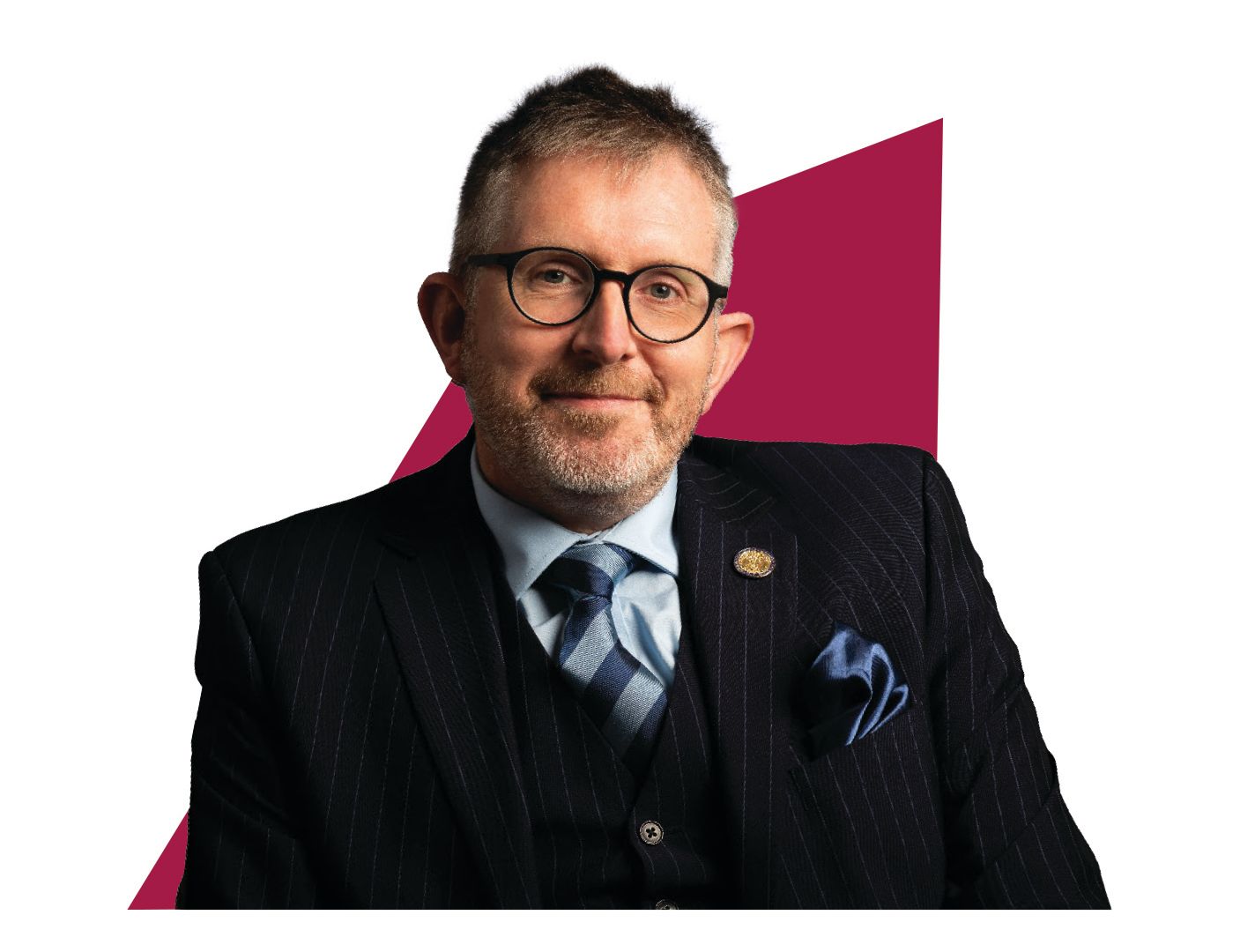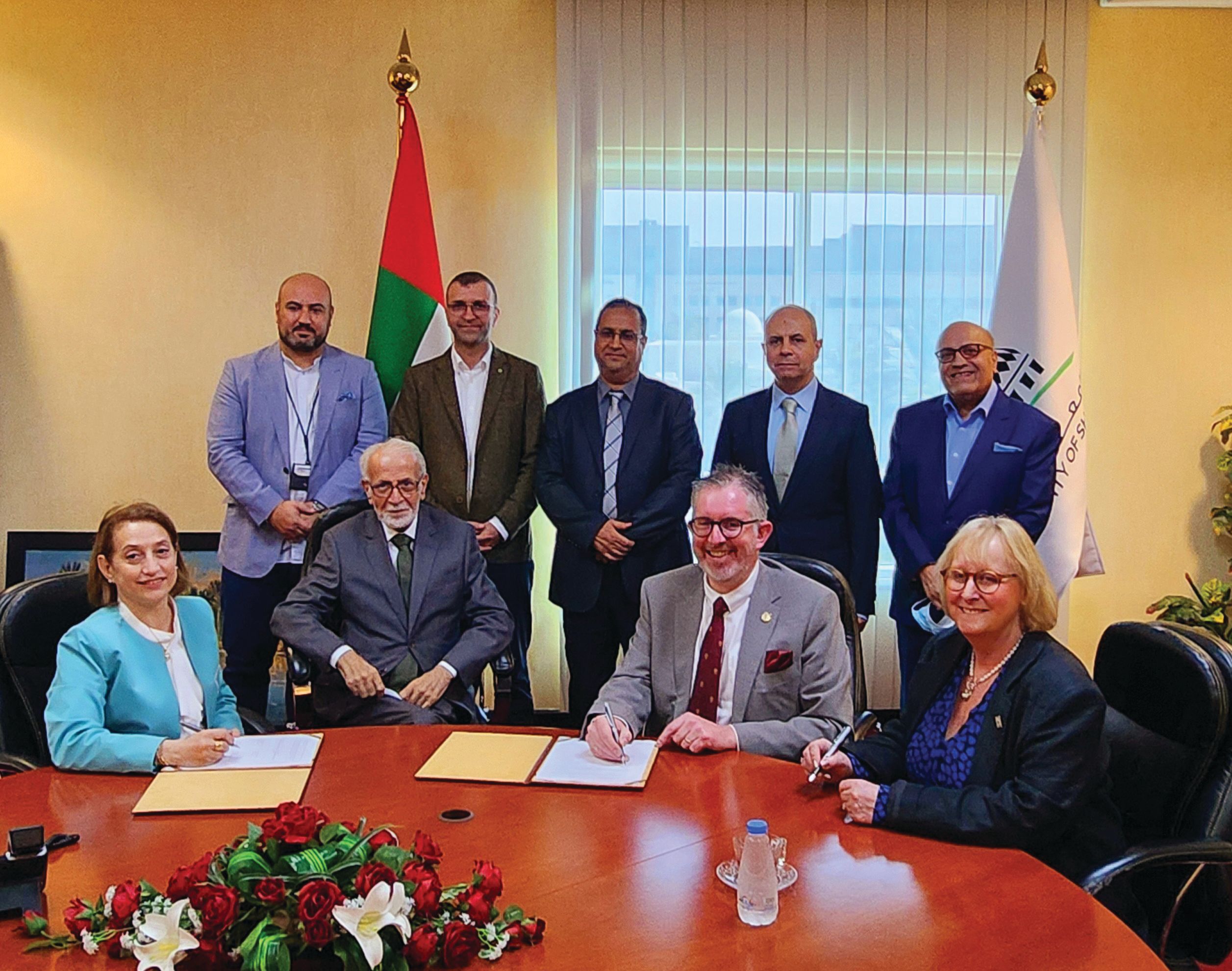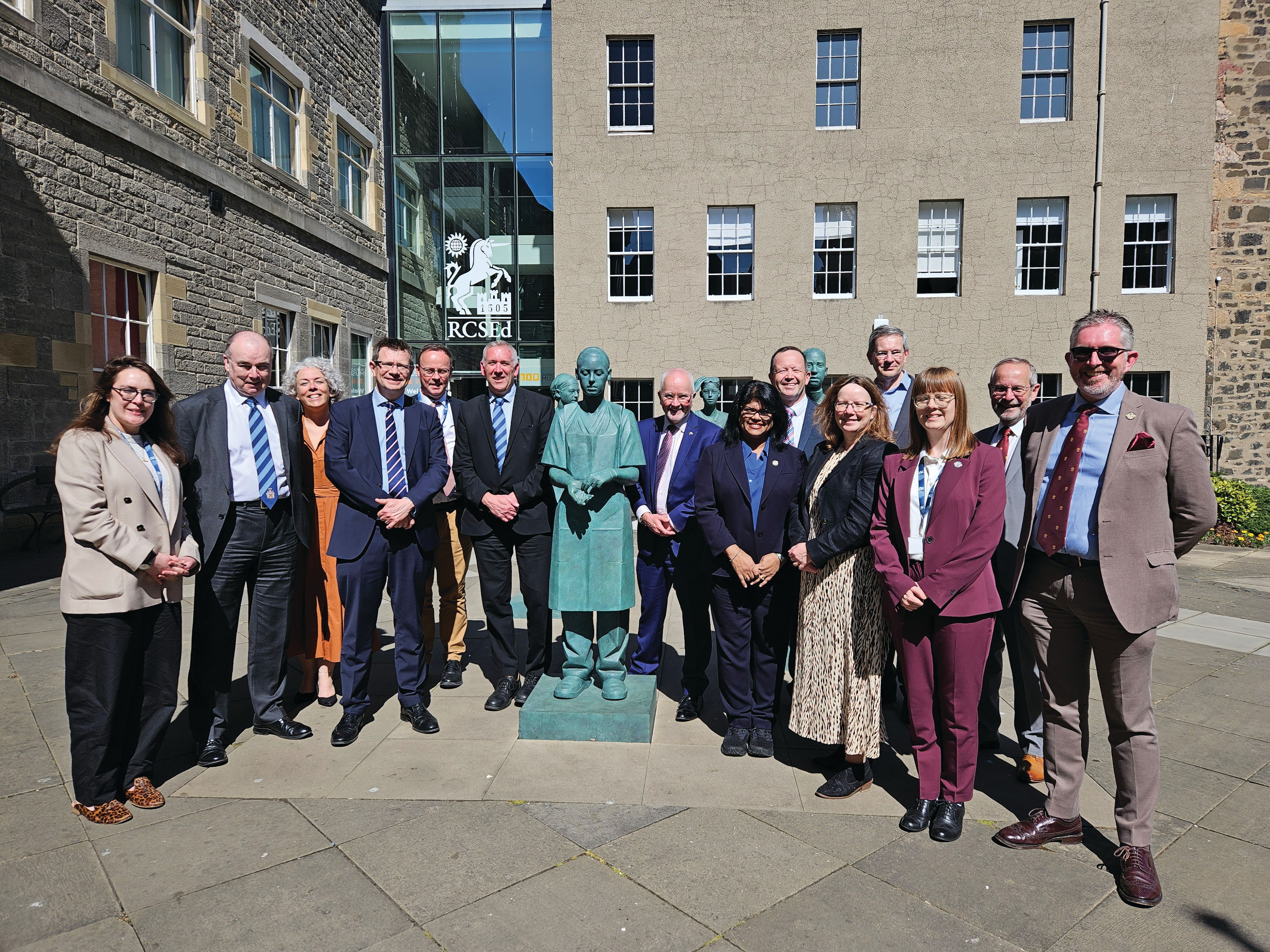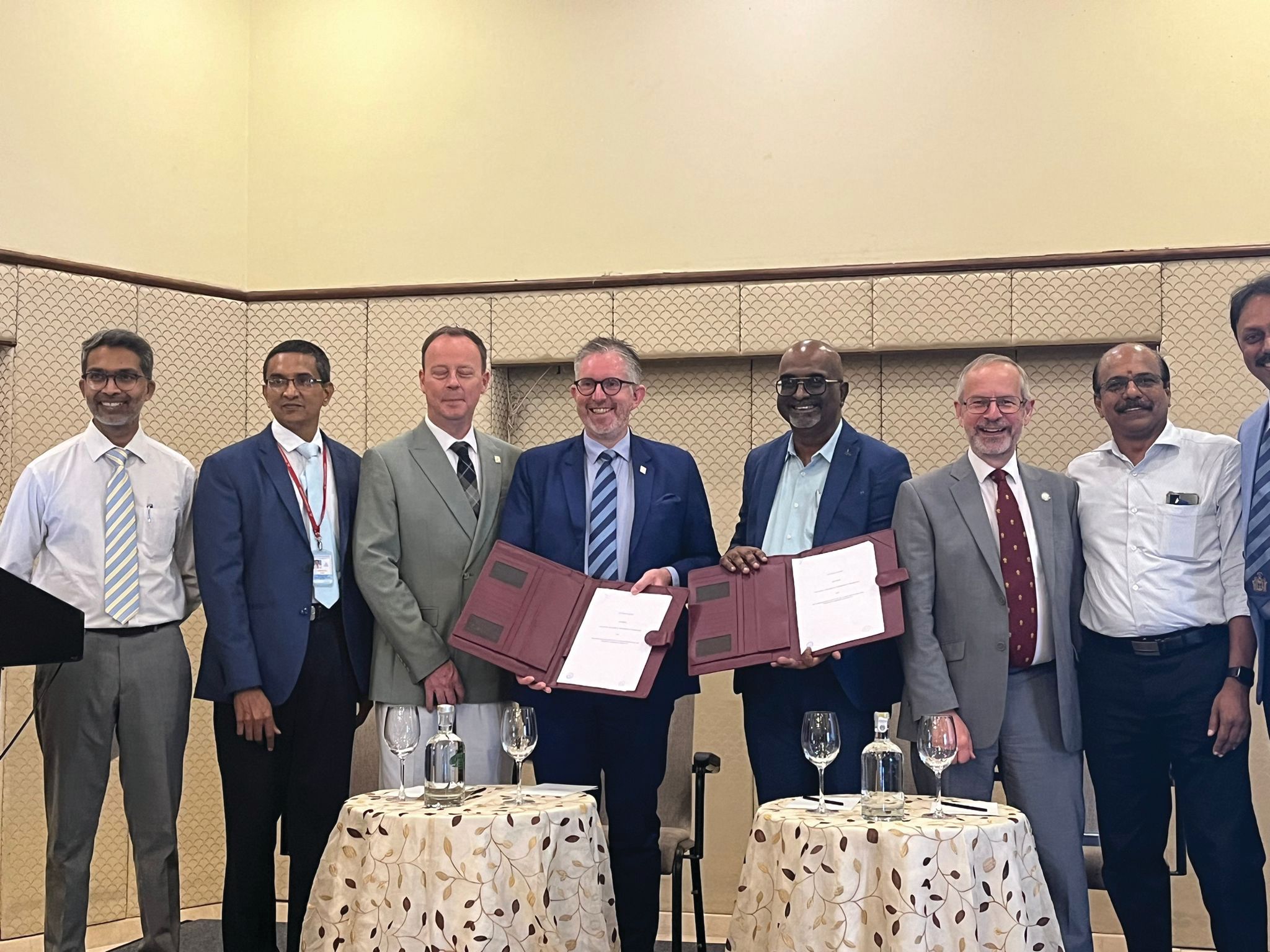Partnerships and stakeholder engagement
Dental Dean Professor Grant McIntyre explores the ever-evolving work of engaging outside partners
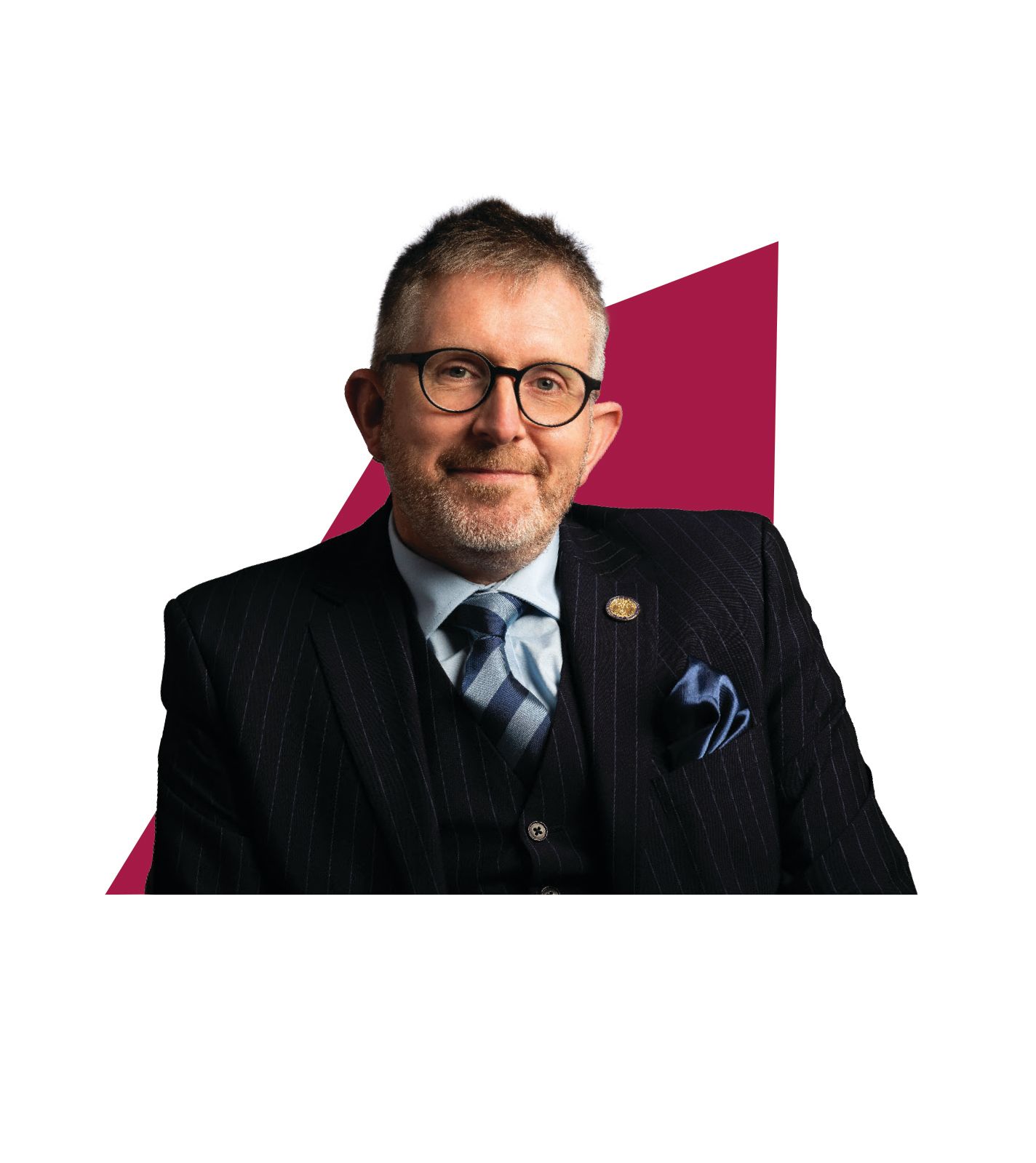
Partnerships and stakeholder engagement
Dental Dean Professor Grant McIntyre explores the ever-evolving work of engaging outside partners
You might not be fully aware of the partnerships and stakeholder engagement (PSE) work that the Faculty of Dental Surgery undertakes. I hope this article informs you about these important activities helping the Faculty to continually interact with the complex and rapidly transforming world. Developing mutually beneficial partnerships and nurturing stakeholder engagement is not a luxury. This is an essential attribute of a modern, dynamic and forward-thinking multi-professional organisation focusing on career-long membership and taking our place in an ever-changing world.
Partnership and stakeholder engagement is, therefore, an important part of both the strategic and operational aspects of Faculty business. This area of work for the Faculty involves various interactions that are both public along with those that are less visible. It goes without saying that both the front-facing and ‘behind the scenes’ PSE activities are key for the Faculty in our broader role as part of the College. In so many ways, PSE is how we operate and advocate on behalf of our membership as well as input to policy on behalf of populations and our profession across the countries where the College operates. It is part of our collective work on our shared mission to improve global oral health, which has the consequent positive dividends for general health and wellbeing.
Signing a memorandum of agreement with the University of Sharjah in February
Signing a memorandum of agreement with the University of Sharjah in February
The Partnership and Stakeholder Engagement directorate within the Royal College of Surgeons of Edinburgh is headed by Director Mariette Naud-Betteridge. It comprises three teams (Policy and Public Affairs, Development and Strategic Partnerships) with an expert and highly engaged group of staff working across our Edinburgh, Birmingham and Kuala Lumpur footprint. The directorate has specific linkages to the Faculty of Dental Surgery through Dental Executive, Dental Council and the wider volunteer network. PSE is, therefore, one of the many threads that weave the Faculty of Dental Surgery and the College together. The team develops and manages strategic partnerships and relationships that benefit the College, including other charities, universities and educational organisations; industry; donors and grant-makers; government bodies; professional bodies; and other decision-makers and opinion-formers in the UK and internationally.
Everything we do within the Faculty of Dental Surgery is based on education, examination, engagement standards and ultimately patient safety. PSE transcends all of these to inform policy, advocacy, workforce, regulators and regulation and clinical practice, and is part of the machinery that has made our Faculty a continuing success.
Hopefully I have provided a flavour of the workstreams, but you may be asking what are the key activities within partnership working and stakeholder engagement for the Faculty of Dental Surgery? At its most basic level, PSE is the ‘glue’ linking the Faculty to other groups of interest, importance and value to the work we do beyond the College. Formal meetings and communications and background diplomacy are of course heavily involved, and a multifaceted strategy is required to ensure the working relationships and interactions deliver outcomes for our members, Faculty, College and wider society. PSE requires both a national and an international focus, particularly because around half of our membership live and work outside the UK. Professor Ivor Chestnutt leads on many of the UK areas as Honorary Secretary and Dr Will McLaughlin on all international matters.
Working in conjunction with the multiplicity of ever-evolving NHS agencies throughout the UK is key. Furthermore, engaging directly with these NHS organisations as well as UK government departments is vital in shaping policy on dental education and training both at undergraduate and postgraduate levels, along with workforce development and recruitment. Working with the Policy and Public Affairs Team, the Faculty regularly contributes to external consultations from the UK General Dental Council, healthcare organisations and governments as well as third-sector organisations on areas involving dentistry and oral health. At the earliest touchpoint, we ensure the clinical voice of the Advisory Board structure and Dental Council forms the key component part of any response. The Faculty is also invited on occasion to provide formal input to other processes that impact either the delivery or format of dental healthcare.
Academic collaboration is another important part of PSE for the Faculty through our working with other assessment bodies such as other royal colleges and universities in the UK and internationally. This requires the development of formal agreements, conjoint examinations and other arrangements that exist to protect and drive the standards of education and ensure that patient safety and reduction of inequalities are addressed across the globe. The Development Team provide a significant amount of input to the working of the Faculty through fundraising, research support and nurturing relationships for the future.
The General Dental Council Executive Team visits RCSEd in May
The General Dental Council Executive Team visits RCSEd in May
Our Specialty Advisory Boards contribute to the education agenda both within the College and externally, with representatives on the Specialist Advisory Committees, Specialty Training Committees, our Dental Examinations Committee and Dental Education Advisory Board. The voice of the Faculty is, therefore, heard at a range of points throughout the landscape of dental training.
Our Dental Ambassador Network and Dental Council also help shape the Faculty’s position on strategy, policy and advocacy. Specifically, as a Faculty we engage with the politicians and public at each Westminster and devolved UK nation election with a manifesto document. We call on politicians to deliver on the oral health agenda. We also make calls from time to time for governments to improve legislation around population lifestyle issues such as smoking and vaping, and comment publicly on other issues pertinent to patient and population health. The current workforce challenge affecting dentistry and the wider healthcare system both in the UK and globally is a concern for the College and, in recent times, an extensive submission has been made to the ongoing UK NHS Medical Training Review.
In addition to voicing the Faculty’s views on advocacy and policy, an important facet of PSE is to listen. The UK and international Dental Ambassador allows the Faculty to not only support the Faculty membership with answers to specific queries of concern for current and future members, but also to hear from the experts ‘on the ground’. In doing so, this provides those operating at a strategic level with relevant and pertinent information as they prepare for meetings and the never-ending series of College documents, as well as the essential conversations that are necessary at the early stages of the development of proposals influencing professional practice around the world.
With a global footprint, formal Faculty of Dental Surgery partnerships with governments and regulators exist in several countries, including the Middle East, South-East Asia, the Indian sub-continent, Australasia and Africa. These facilitate the delivery of RCSEd education, examinations and accreditation, along with the development of local examiners and the recognition of RCSEd qualifications for professional practice. Some of these agreements are high level to foster the subsequent development of more focused agreements, while others are detailed and, on occasion, concentrate on a small number of mutually important objectives. Such developments make a substantial contribution to the overall agenda for the global standard of oral healthcare, and help in the development of local workforce where shortages exist. In developing these relationships, a considerable amount of collective College effort through the Strategic Partnerships Team, as well as resource, is often required over a protracted period of time, particularly as the political scenery changes around the world.
While the Faculty’s ongoing engagement strategy continues to yield multiple successes, challenges remain. Balancing consistency in the approach across regions with flexibility for individual countries is a persistent tension. Maintaining effective communication across time zones, regulatory systems and languages requires investment in key contacts and local partnerships, as well as the College staff and volunteers. A corporate growth mindset is an essential tool in finding successful solutions along with local intelligence to understand the needs of our membership.
Signing a letter of intent between RCSEd and Sri Ramachandra University in August 2024
Signing a letter of intent between RCSEd and Sri Ramachandra University in August 2024
Our Faculty is always looking into what the future holds, with partnership and stakeholder engagement remaining central to our overall mission, based around our College values. Nurturing new as well as renewing existing partnerships remains important, as well as continuing to create a culture of openness in advocacy and policy at all levels within the Faculty. Furthermore, expanding our sphere of influence in the UK and across the globe, strengthening existing links with all relevant parties to support career paths within dentistry as well as promoting improvements in population oral health continue to be central. As ever in our continuously evolving profession, the ability to listen, learn and lead in collaboration with other organisations is a key metric for success. The Faculty of Dental Surgery at RCSEd is not only keeping pace with this reality, it is also helping to continually shape the fabric of global oral health.
Hearing directly from our Members and Fellows is important to me. Please feel free to get in contact at dental@rcsed.ac.uk.
You might not be fully aware of the partnerships and stakeholder engagement (PSE) work that the Faculty of Dental Surgery undertakes. I hope this article informs you about these important activities helping the Faculty to continually interact with the complex and rapidly transforming world. Developing mutually beneficial partnerships and nurturing stakeholder engagement is not a luxury. This is an essential attribute of a modern, dynamic and forward-thinking multi-professional organisation focusing on career-long membership and taking our place in an ever-changing world.
Partnership and stakeholder engagement is, therefore, an important part of both the strategic and operational aspects of Faculty business. This area of work for the Faculty involves various interactions that are both public along with those that are less visible. It goes without saying that both the front-facing and ‘behind the scenes’ PSE activities are key for the Faculty in our broader role as part of the College. In so many ways, PSE is how we operate and advocate on behalf of our membership as well as input to policy on behalf of populations and our profession across the countries where the College operates. It is part of our collective work on our shared mission to improve global oral health, which has the consequent positive dividends for general health and wellbeing.
Signing a memorandum of agreement with the University of Sharjah in February
Signing a memorandum of agreement with the University of Sharjah in February
The Partnership and Stakeholder Engagement directorate within the Royal College of Surgeons of Edinburgh is headed by Director Mariette Naud-Betteridge. It comprises three teams (Policy and Public Affairs, Development and Strategic Partnerships) with an expert and highly engaged group of staff working across our Edinburgh, Birmingham and Kuala Lumpur footprint. The directorate has specific linkages to the Faculty of Dental Surgery through Dental Executive, Dental Council and the wider volunteer network. PSE is, therefore, one of the many threads that weave the Faculty of Dental Surgery and the College together. The team develops and manages strategic partnerships and relationships that benefit the College, including other charities, universities and educational organisations; industry; donors and grant-makers; government bodies; professional bodies; and other decision-makers and opinion-formers in the UK and internationally.
Everything we do within the Faculty of Dental Surgery is based on education, examination, engagement standards and ultimately patient safety. PSE transcends all of these to inform policy, advocacy, workforce, regulators and regulation and clinical practice, and is part of the machinery that has made our Faculty a continuing success.
Hopefully I have provided a flavour of the workstreams, but you may be asking what are the key activities within partnership working and stakeholder engagement for the Faculty of Dental Surgery? At its most basic level, PSE is the ‘glue’ linking the Faculty to other groups of interest, importance and value to the work we do beyond the College. Formal meetings and communications and background diplomacy are of course heavily involved, and a multifaceted strategy is required to ensure the working relationships and interactions deliver outcomes for our members, Faculty, College and wider society. PSE requires both a national and an international focus, particularly because around half of our membership live and work outside the UK. Professor Ivor Chestnutt leads on many of the UK areas as Honorary Secretary and Dr Will McLaughlin on all international matters.
Working in conjunction with the multiplicity of ever-evolving NHS agencies throughout the UK is key. Furthermore, engaging directly with these NHS organisations as well as UK government departments is vital in shaping policy on dental education and training both at undergraduate and postgraduate levels, along with workforce development and recruitment. Working with the Policy and Public Affairs Team, the Faculty regularly contributes to external consultations from the UK General Dental Council, healthcare organisations and governments as well as third-sector organisations on areas involving dentistry and oral health. At the earliest touchpoint, we ensure the clinical voice of the Advisory Board structure and Dental Council forms the key component part of any response. The Faculty is also invited on occasion to provide formal input to other processes that impact either the delivery or format of dental healthcare.
Academic collaboration is another important part of PSE for the Faculty through our working with other assessment bodies such as other royal colleges and universities in the UK and internationally. This requires the development of formal agreements, conjoint examinations and other arrangements that exist to protect and drive the standards of education and ensure that patient safety and reduction of inequalities are addressed across the globe. The Development Team provide a significant amount of input to the working of the Faculty through fundraising, research support and nurturing relationships for the future.
The General Dental Council Executive Team visits RCSEd in May
The General Dental Council Executive Team visits RCSEd in May
Our Specialty Advisory Boards contribute to the education agenda both within the College and externally, with representatives on the Specialist Advisory Committees, Specialty Training Committees, our Dental Examinations Committee and Dental Education Advisory Board. The voice of the Faculty is, therefore, heard at a range of points throughout the landscape of dental training.
Our Dental Ambassador Network and Dental Council also help shape the Faculty’s position on strategy, policy and advocacy. Specifically, as a Faculty we engage with the politicians and public at each Westminster and devolved UK nation election with a manifesto document. We call on politicians to deliver on the oral health agenda. We also make calls from time to time for governments to improve legislation around population lifestyle issues such as smoking and vaping, and comment publicly on other issues pertinent to patient and population health. The current workforce challenge affecting dentistry and the wider healthcare system both in the UK and globally is a concern for the College and, in recent times, an extensive submission has been made to the ongoing UK NHS Medical Training Review.
In addition to voicing the Faculty’s views on advocacy and policy, an important facet of PSE is to listen. The UK and international Dental Ambassador allows the Faculty to not only support the Faculty membership with answers to specific queries of concern for current and future members, but also to hear from the experts ‘on the ground’. In doing so, this provides those operating at a strategic level with relevant and pertinent information as they prepare for meetings and the never-ending series of College documents, as well as the essential conversations that are necessary at the early stages of the development of proposals influencing professional practice around the world.
With a global footprint, formal Faculty of Dental Surgery partnerships with governments and regulators exist in several countries, including the Middle East, South-East Asia, the Indian sub-continent, Australasia and Africa. These facilitate the delivery of RCSEd education, examinations and accreditation, along with the development of local examiners and the recognition of RCSEd qualifications for professional practice. Some of these agreements are high level to foster the subsequent development of more focused agreements, while others are detailed and, on occasion, concentrate on a small number of mutually important objectives. Such developments make a substantial contribution to the overall agenda for the global standard of oral healthcare, and help in the development of local workforce where shortages exist. In developing these relationships, a considerable amount of collective College effort through the Strategic Partnerships Team, as well as resource, is often required over a protracted period of time, particularly as the political scenery changes around the world.
While the Faculty’s ongoing engagement strategy continues to yield multiple successes, challenges remain. Balancing consistency in the approach across regions with flexibility for individual countries is a persistent tension. Maintaining effective communication across time zones, regulatory systems and languages requires investment in key contacts and local partnerships, as well as the College staff and volunteers. A corporate growth mindset is an essential tool in finding successful solutions along with local intelligence to understand the needs of our membership.
Signing a letter of intent between RCSEd and Sri Ramachandra University in August 2024
Signing a letter of intent between RCSEd and Sri Ramachandra University in August 2024
Our Faculty is always looking into what the future holds, with partnership and stakeholder engagement remaining central to our overall mission, based around our College values. Nurturing new as well as renewing existing partnerships remains important, as well as continuing to create a culture of openness in advocacy and policy at all levels within the Faculty. Furthermore, expanding our sphere of influence in the UK and across the globe, strengthening existing links with all relevant parties to support career paths within dentistry as well as promoting improvements in population oral health continue to be central. As ever in our continuously evolving profession, the ability to listen, learn and lead in collaboration with other organisations is a key metric for success. The Faculty of Dental Surgery at RCSEd is not only keeping pace with this reality, it is also helping to continually shape the fabric of global oral health.
Hearing directly from our Members and Fellows is important to me. Please feel free to get in contact at dental@rcsed.ac.uk.
Read more



